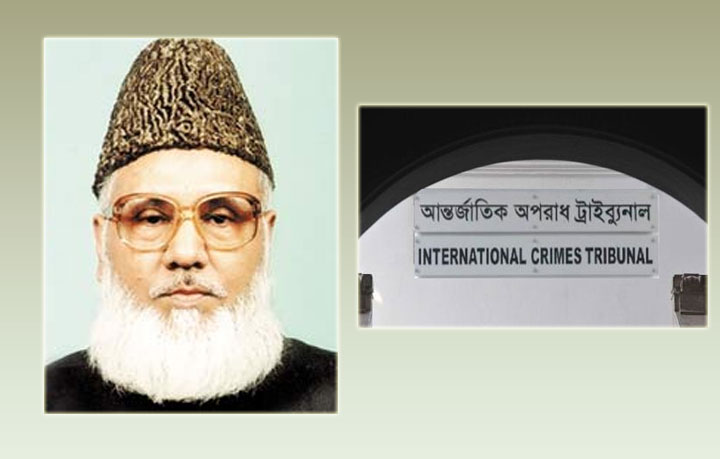
The International Crimes Tribunal (ICT) will declare on Tuesday its judgment in the trial of Jamaat-e-Islami chief Motiur Rahman Nizami for his crimes against humanity during the 1971 Liberation War. On the closing day of the rehearing on summing-up arguments on March 24, both the prosecution and the defence lawyers made contradictory claims over the fate of the war crimes accused, the 1971 villainous Al Badr supremo Motiur Rahman Nizami, now Jamaat-e-Islami ameer. The prosecution lawyers demanded capital punishment to Nizami before the International Crimes Tribunal (ICT)-1 for committing crimes against humanity, including genocide, during the war, as it has proved 15 out of 16 charges ‘beyond any shadow of doubt’. The defence lawyers, however, prayed for Nizami’s acquittal from the charges as the evidence of the prosecution witnesses appears ‘tutored’ for which there is no scope of awarding any sentence sans letting him off. After hearing both the sides, the tribunal kept pending its judgment to be delivered any day. Recalling its earlier order (judgment to be delivered any day), the three-member tribunal with its newly-appointed chairman Justice M Enayetur Rahim, who took over 56 days after his predecessor Justice ATM Fazle Kabir went on retirement, started the rehearing on March 10 with the prosecution case summing-up arguments along with law points. Earlier, the three-member tribunal with Justice ATM Fazle Kabir as its chairman had kept pending its verdict in the Nizami case to be delivered any day, after closing the summing-up arguments from both the prosecution and the defence lawyers since November last year. A former minister during the past BNP-Jamaat rule, Nizami, since condemned to death in the Chittagong 10-truck arms haul case, faces 16 counts of charges of involvement in murders and torture of unarmed people along with hatching conspiracies, planning, incitement and complicity to commit genocide and crimes against humanity during the 1971 Liberation War in collaboration with the Pakistan occupation army. The prosecution, however, did not press one charge (Ishwardi mass killing) as they failed to produce its witnesses. On May 28, 2012, the tribunal indicted the Jamaat chief for committing crimes against humanity, including genocide and killing of intellectuals, to make the country intellectually bankrupt at the fag end of the Liberation War, knowing their ignominious defeat. Nizami was arrested from in front of the Jatiya Press Club on June 29, 2010, after a magistrate court in Dhaka issued a warrant of arrest in connection with a criminal case over hurting the religious sentiment of Muslims. Later, responding to a prosecution plea, the tribunal on July 22 the same year showed him arrested in the war crimes case. – UNB, Dhaka.

